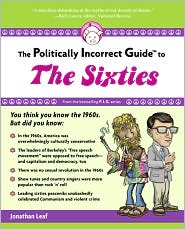|
|
|
The 1960s are popularly believed to be all about sex, drugs, and rock 'n' roll, but playwright and cultural critic Jonathan Leaf has given us another view in his book called The Politically Incorrect Guide to the Sixties. Yes, there was some youthful rebellion and social upheaval, but throughout the 1960s America remained a conservative nation, in many ways extremely so. Leaf shows how the much publicized radicalism was actually confined to a small group of isolated extremists who later rewrote the decade's history, casting themselves as heroes. Leaf nevertheless takes a careful second look at the 1960s protest movements, the Earl Warren court, the sexual revolution, the drug culture, the Vietnam War, and Hollywood. The radicals were able to write a false history of the 1960s because many of them went on to graduate school in order to avoid the military draft for the Vietnam War. After getting an advanced degree, many became college professors, where they could write books and textbooks, while living the comfortable, bourgeois lifestyle they had spent the previous decade denouncing. From positions of influence in academia, the '60s radicals disproportionately affected our culture. Leaf writes a particularly good chapter on the rise of the feminist movement and the influence of Gloria Steinem and Betty Friedan. Leadership of the movement then shifted to others who were even more radical. Leaf quotes Eleanor Smeal as sounding off with a rant about the "Straight-White-Religious-Right-Conservative-Republican-Male-Conspiracy against women," claiming that "America was a world of unrelenting racism, sexism, and homophobia." Leaf concludes that the feminist movement was "a key factor in the breakdown of the American family." Its most noteworthy achievements were the legalization of abortion and of unilateral divorce. Another excellent chapter sets forth the tremendous impact Earl Warren had on the Supreme Court, where his decisions showed his "abiding faith in the wisdom and necessity of big, coercive government." He became Chief Justice because of a crooked deal made at the 1952 Republican National Convention, and President Eisenhower later bitterly regretted having made this appointment. Americans who lived through the 1960s will enjoy remembering that period through the lens of a very different point of view. (Regnery Publishing Co., 2009, 247 pages, $25) |
 In truth, as Leaf explains, mainstream America was very conservative and survived every outrage the radicals hurled against traditional values and customs.
In truth, as Leaf explains, mainstream America was very conservative and survived every outrage the radicals hurled against traditional values and customs.

